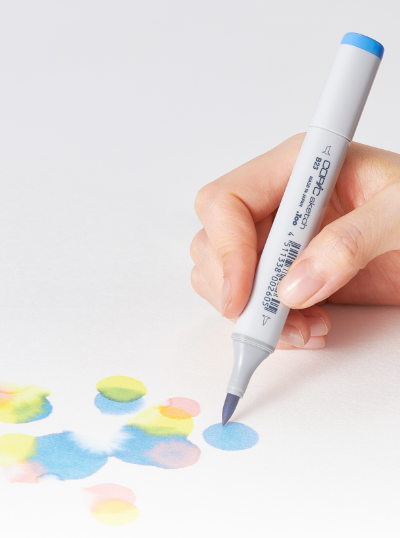Textures, Draw + Outline a House
16-07-2023
Texture Series: How to color textures with Copic markers
Today’s Feature:
How to draw and outline a house design with Copic Multiliner Pens!

Hello Copic readers! In our previous set of blogs, we showed how to color 3 different sets of brick, stone, and wood patterns. In today’s blog, we’re going to put all of those texture skills to the test by drawing and outlining our very own house design! So, without further ado, let’s put our architecture hats on and get started by gathering our reference images and materials below!

The first thing you’ll want to do before any coloring can occur is find at least 3 reference images of different homes or house styles that you like. Reference-gathering can be done online, around your neighborhood, or from a screenshot of a favorite movie of yours, etc. The important thing to do here is to find a style that you like from the outside so you can successfully draw your home!
Once your references have been gathered, grab a pencil, eraser, ruler, and a few sheets of marker-friendly paper. We recommend Neenah Bright White Premium Cardstock 65 lb., Strathmore 400 series marker paper, or something similar that’s good for outlining and layering.

Then, once your photos and materials have been gathered, let’s get started by using our pencil and ruler to draw a line/guide down the center of our paper. If the home you're referring to has a vertical format, draw your line at 4.25 inches (assuming you’re working on an 8.5 x 11 sheet of paper like me). Then, add a 0.25 inch border around the entire paper. This will give you a crisp, white border that will make the drawing stand out later, once it’s been colored (especially when coloring the large area of the sky!).
Note: if you aren’t sure about drawing from scratch but want to follow along with the outlining tips of this blog, print the above right template here in our line art gallery and you can practice outlining with a black pen on top of the light gray outlines.

Now that we have our guides in place, it’s time to start drawing our home! Personally, I don’t enjoy working with exact measurements, so I won’t be using my ruler any more in this drawing. However, if you want more precision, feel free to use a ruler to mark measurements, draw straight lines, and use it as a general guide. For me though, I use a “bullet point” technique, where I sketch a little dot at the corners or ends of lines I want to make, and connect them from there, pressing lightly to the paper, knowing that I might not get it right the first time and have to erase it later.

I began drawing the house above like I do with any other: by starting with the main exterior shapes and then working my way in. So, that means I started with the outer walls, then the roofline, then the front door. After those shapes were good to go, I begin to add in details: the windows, window pane designs, railings, shrubbery and/or flowers, etc. Sometimes I have to make adjustments to my big exterior walls because I accidentally drew them too small! Whenever that happens, I just draw parallel lines beside the ones I don’t like and erase them after. Leaving behind lines you don’t like as a guide while you draw the new ones in is a great trick I’ve been using in my sketches for years!

Now that my pencil sketch is to where I want it to be, it’s time to get out my pens to start outlining! I like to outline my drawings first before coloring because I like to scan my line work into my computer. I do this so I can edit the drawing and make prints of it onto other sheets of marker paper in case I mess up my first attempt at coloring. Plus, you never know when you may want to color one of your drawings again, but using a different palette!
For a mid-size drawing like this, I like to choose 2 pen widths; one bigger for the large outlines and one smaller for all the details. With that being said, I chose Black 0.8 and 0.5, and started with the thicker exterior walls, following the same guides stated earlier. The larger, more dominant features of the home are going to be outlined with 0.8, and the details outlined second will be with 0.5.
Note: I want to point out that I’m right-handed, so I work from left to right, as that’s the easiest way to not create smudges in my work. When in doubt though, if you think an area is still drying from a fresh application of ink, wait 30 seconds and then continue to outline.

Additional tips for outlining:
- Don’t press too hard with your pen nib to the paper. The ink will flow naturally. Pressing the nib hard to the paper over time will cause the delicate nib to warp to one side, making your neutral-shaped nib permanently damaged.
- Work from left to right if right-handed, and right to left if left -handed
- Move the paper around instead of contorting your hand to move for the paper
- Your hand should be laid softly on the page, being able to glide down the long exterior wall in one or two passes
- Relax! Drawing should be fun! If you feel too tense or nervous, it will show in your lines. Relax, take a deep breath, and exhale as you draw your lines if you “get in your head,” so to speak
- When in doubt, scan your pencil drawing (if you have a scanner at home) in case you mess up. Then print the pencil sketch on marker paper and try again! And remember, all of the great masters were once students too.

And with that, we wrap up today’s blog! If you’d like to outline the home drawing I’ve created with your own set of black pens, print the above left template here on an 8.5 x 11 inch sheet of cardstock or marker paper (one that’s suitable for alcohol-based markers and layering), and put your skills to the test! Once you’ve outlined your own version, share it with us on social media using the hashtag #CopicWithUs, or tag us @CopicOfficialUS on any social media platform!
BONUS! If you want to get a head start on next month’s blog, where we’ll be showing you how you can color this outlined drawing, print the above left template here (following the same printing instructions) and start making some swatches to find your perfect color combination!

Until next time, check out our online store for all your favorite Copic marker sets! Don’t forget to sign up for the Copic Club to get rewarded for your purchases (and to win some swag) too!
Read More Articles
Copic Acrea on Canvas
How to use Acrea on various types of Canvas Hello Copic readers! In our previous blog, we wrapped up our discussion on how to use Acrea o...

The Best Papers for COPIC Acrea
How to Layer with Acrea on Various Types of Paper Hello Copic readers! In our previous blog, we wrapped up our discussion on how to use ...

Copic Acrea with Copic Ink
How can Acrea be used with Copic Ink? Greetings Copic readers! In our previous blog, we discussed how Acrea compares with Copic Multil...

Copic Acrea with Multiliners
How does Acrea compare with Copic Multiliner Pens? Greetings Copic readers! In our previous blog, we discussed how Acrea compares to the ...





